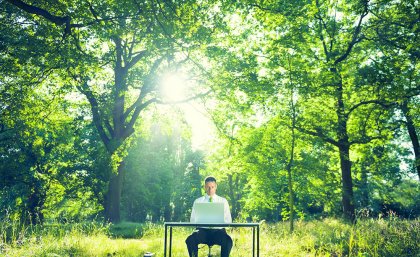
An office enriched with plants makes staff happier and boosts productivity by 15 per cent, a University of Queensland researcher has found.
The study is the first of its kind to assess the long-term impacts of plants in an office environment.
Co-authored by Professor Alex Haslam from UQ’s School of Psychology, the study found that adding plants to an office also improved employee satisfaction and quality of life.
Professor Haslam said a green office helps employees to be more physically, mentally and emotionally involved in their work.
“Office landscaping helps the workplace become a more enjoyable, comfortable and profitable place to be,” he said.
“It appears that in part this is because a green office communicates to employees that their employer cares about them and their welfare.
“Employees from previously lean office environments experienced increased levels of happiness, resulting in a more effective workplace.”
The study was conducted in partnership with researchers from Cardiff University, the University of Exeter and the University of Groningen.
The research team examined the impact ‘lean’ versus ‘green’ office space has on employees from two large commercial offices in the UK and the Netherlands.
The team monitored staff productivity levels over a two-month period, and employees were surveyed to determine perceptions of air quality, concentration, and workplace satisfaction.
“Employees were more satisfied with their workplace and reported increased concentration levels and better perceived air quality in an office with plants,” Professor Haslam said.
“The findings suggest that investing in landscaping an office will pay off through an increase in office workers’ quality of life and productivity.”
Professor Haslam also said the findings challenge modern business philosophies that suggest a lean office is a more productive one.
"The 'lean' philosophy has been influential across a wide range of organisational domains,” he said.
“Modern offices and desks have been stripped back to create sparse spaces - our findings question this widespread theory that less is more – sometimes less is just less.”
The study is published in the Journal of Experimental Psychology: Applied.
Professor Haslam and UQ's Dr Nick Lavidis talk about the benefits of green environments here.
Media: Helen Burdon, Marketing and Communications, Faculty of Health and Behavioural Sciences, 3365 7436, 0412 744 437, h.burdon@uq.edu.au
.jpg)










